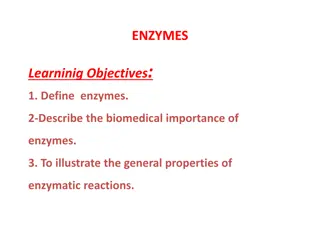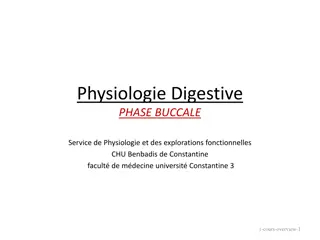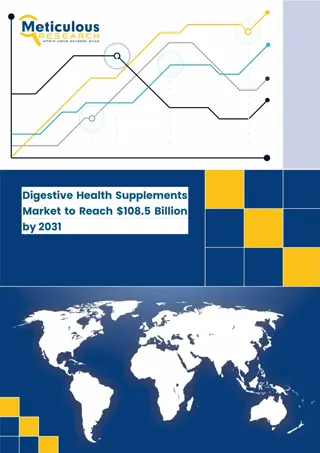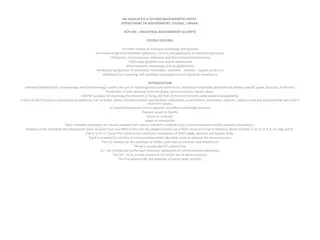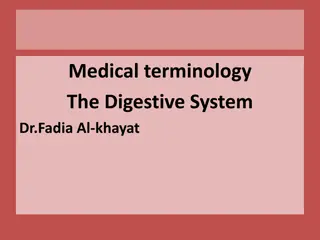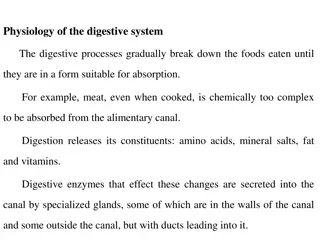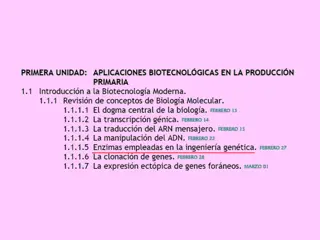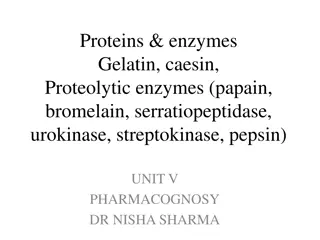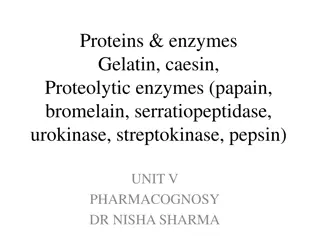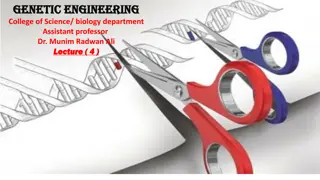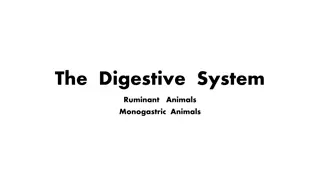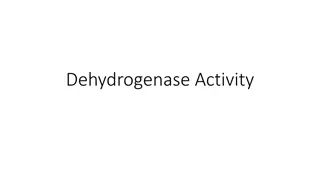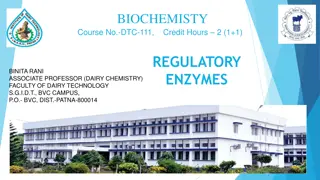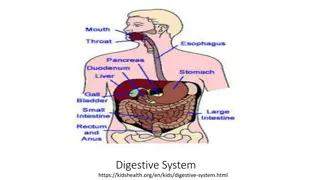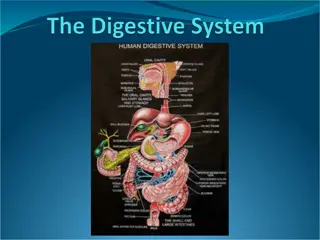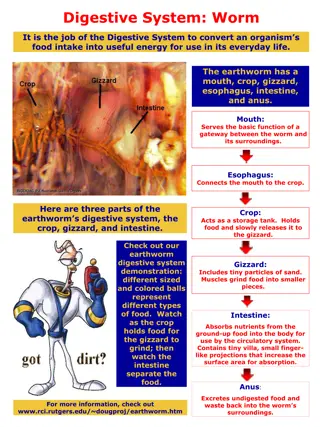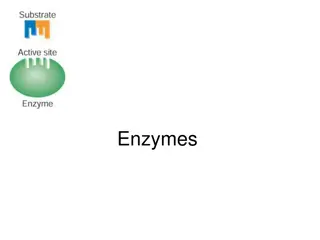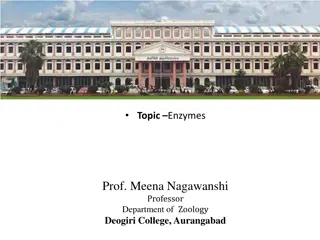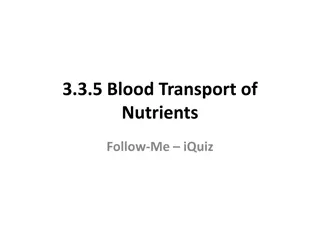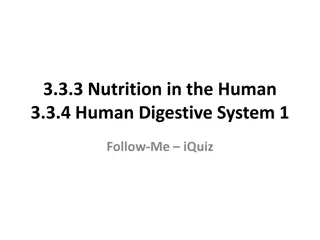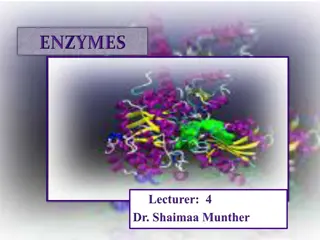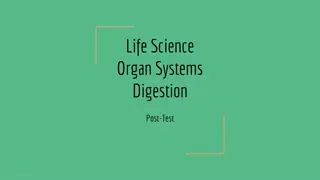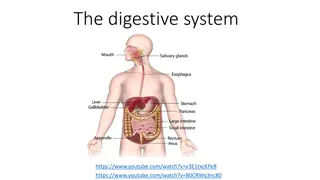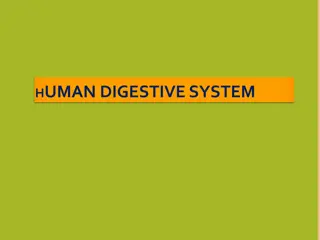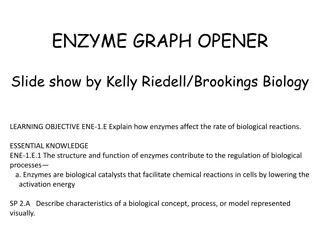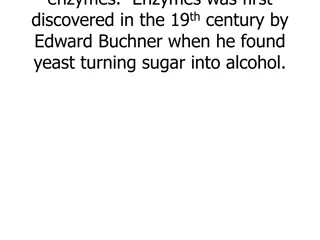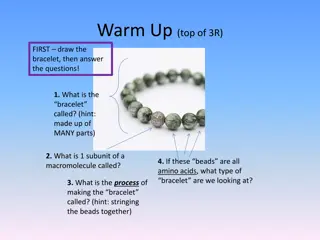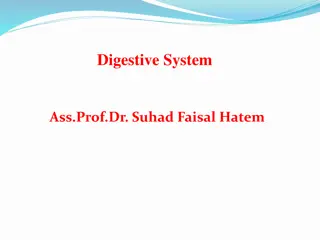Enzymes are Proteins that act as Biological Catalyst
Enzymes, as proteins acting as biological catalysts, accelerate chemical reactions without being consumed. They have active sites where substrates bind, and their specificity can be lock-and-key or induced fit. Enzymes are named based on their function or the substrates they interact with. Enzyme sp
5 views • 20 slides
Enzymes: Importance and Clinical Applications
Enzymes are vital proteins that speed up chemical reactions without being consumed, playing a crucial role in various physiological processes. They require cofactors for optimal function, and their levels in blood can indicate tissue damage or disease. Learning about enzymes is essential for underst
6 views • 25 slides
Physiologie Digestive PHASE BUCCALE
Digestive physiology involves the breakdown of food into simple nutrients for absorption by the body. It includes mechanical and chemical means of food degradation using enzymes from salivary, gastric, pancreatic, and colonic bacteria. The digestive system comprises the mouth, esophagus, stomach, li
5 views • 25 slides
Digestive Health Supplements Market - Global Opportunity Analysis
Digestive Health Supplements Market, Digestive Health Supplements, Gut Health Supplements, Prebiotics, Probiotics, Enzymes, Digestive Supplements\n
5 views • 3 slides
Comprehensive Overview of Pancreas Function and Structure
Pancreas is a vital organ in the abdomen with dual exocrine and endocrine functions. As an exocrine organ, it secretes digestive enzymes and bicarbonates into the duodenum for food breakdown. In its endocrine role, the pancreas regulates blood sugar levels by secreting insulin, glucagon, somatostati
1 views • 16 slides
Overview of Industrial Biochemistry and Biotechnology
This course outline covers key topics in industrial biochemistry, microbiology, and biotechnology, focusing on the use of microorganisms and molecules to achieve specific goals in production processes. It delves into microbial physiology, genetics, metabolic pathways, enzymes, microbial growth, ferm
0 views • 10 slides
The Digestive System: Medical Terminology Overview
The digestive system, comprising the gastrointestinal tract (GIT) and accessory organs, plays a vital role in digestion. From the upper GI tract (oral cavity, esophagus, stomach) to the lower GI tract (small and large intestines), each part has specific functions. Understanding salivary glands and c
3 views • 18 slides
COX Enzymes and Their Impact on Pain and Inflammation
COX enzymes, including COX1, COX2, and COX3, play a crucial role in synthesizing prostanoids like prostaglandins in the body, affecting pain and inflammation. By inhibiting these enzymes, relief from pain and inflammation can be achieved. However, non-selective COX inhibitors may lead to various sid
0 views • 21 slides
Overview of Digestive System Physiology and Functions
The digestive system functions to break down food into absorbable forms through processes like ingestion, propulsion, digestion, absorption, and elimination. Specific organs and enzymes play key roles in these processes, ultimately providing nutrients for the synthesis of body constituents and energ
0 views • 13 slides
Applications of Enzymes in Clinical Diagnosis: A Comprehensive Overview
Enzymes play a crucial role in cellular metabolism and are essential for various biochemical reactions in living organisms. This detailed study explores the sources, classification, properties, and factors affecting enzymes, emphasizing their applications in diagnostic and analytical processes. By h
1 views • 35 slides
Overview of Key Enzymes in Modern Biotechnology
This content provides insights into important enzymes used in modern biotechnology, focusing on DNA ligases and polymerases. It delves into the structures, mechanisms, and characteristics of these enzymes, such as Taq polymerase and bacteriophage T4 DNA ligase. Through detailed descriptions and imag
1 views • 15 slides
Proteins, Enzymes, and Gelatin: A Comprehensive Overview
Proteins are essential for the structure and function of living cells, while enzymes play crucial roles in various biological processes. Gelatin, derived from bones, skins, and tendons of animals, is a valuable substance with unique properties. This content explores the significance of proteins, the
0 views • 10 slides
Proteins and Enzymes: Classification, Sources, and Applications
Proteins and enzymes play crucial roles in various biological processes. Enzymes act as catalysts, with different types classified based on their functions. Papain enzyme, derived from Carica papaya, exemplifies proteolytic enzymes used in the food and beverage industry as a meat tenderizer and in c
2 views • 15 slides
Enzymes: Nature, Classification, and Mechanism of Action
Enzymes are biocatalysts synthesized by living cells. They are protein in nature and specific in their action. This article delves into the definition of enzymes, classification based on enzymatic action, enzyme class reactions, structure, and mechanism of enzyme action, highlighting how enzymes pla
1 views • 19 slides
Insights into Enzymes in Genetic Engineering
Discover the role of enzymes like Polynucleotide Phosphorylase, Deoxyribonuclease, and Phosphatase in genetic engineering processes. Learn how these enzymes regulate mRNA processing, DNA cleavage, and phosphate group cleavage, crucial for various applications in biotechnology.
0 views • 13 slides
The Digestive System of Ruminant Animals
Ruminant animals have a unique digestive system that allows them to efficiently digest cellulose. Their stomach consists of four chambers, each serving a specific function in the digestion process. The breakdown of cellulose by microbes in the rumen produces glucose, which provides energy for the an
0 views • 22 slides
Ostomy Diet and Nutrition Guidelines for Improved Digestive Health
Learn about the role of diet and nutrition in managing digestive health post-ostomy surgery. Clinical Dietitian Sucheta Vijay Limaye provides essential tips on low-roughage diets, managing short bowel syndrome, and meeting energy and protein requirements. Follow expert recommendations for optimal nu
1 views • 21 slides
Enzymes in Industrial Processes: Applications and Benefits" (58 characters)
Enzymes play a crucial role in various industrial processes, such as denim bleaching, food production, brewing, and more. They are used for enhancing efficiency, achieving desirable outcomes, and creating innovative products in industries like food, dairy, starch, brewing, and paper. Enzymes like am
0 views • 16 slides
Dehydrogenase Enzymes and Their Activities
Dehydrogenases are intracellular respiratory enzymes that play a crucial role in oxidation-reduction reactions by transferring hydrogen atoms. This article explores the functions and properties of dehydrogenase enzymes, including the procedure to demonstrate their activity in a plant sample. Lactate
0 views • 9 slides
Enzymes in Biochemistry: Properties, Specificity, and Regulation
Enzymes are biological catalysts that accelerate biochemical reactions without being altered themselves. They exhibit specificity by binding to particular substrates at active sites to convert them into products. Enzymes can be regulated to match the cell's needs, either through activation or inhibi
1 views • 24 slides
Regulatory Enzymes in Biochemical Pathways
Regulatory enzymes play a crucial role in controlling the activity of biochemical pathways by responding to the presence of specific molecules. They regulate the pathway's activity, ensuring that products are produced in the required amounts at different times. This article delves into the significa
5 views • 22 slides
Intricacies of the Digestive System
The digestive system plays a crucial role in converting food into nutrients and eliminating waste from the body. It involves a complex network of organs such as the mouth, stomach, intestines, liver, pancreas, and gallbladder. Discover interesting facts and details about the digestive system, includ
0 views • 18 slides
The Human Digestive System: A Comprehensive Overview
The digestive system plays a vital role in breaking down food into nutrients for absorption. This process involves stages like ingestion, digestion, absorption, and egestion. Beginning with the mouth, food moves through the esophagus, stomach, and small intestine for digestion and absorption of nutr
0 views • 21 slides
The Digestive System of Worms: Functions and Structure
The digestive system of a worm plays a crucial role in converting its food intake into energy. It consists of various parts such as the mouth, crop, gizzard, esophagus, intestine, and anus. The mouth serves as the entry point for food intake, leading to further digestion through the other components
0 views • 9 slides
Digestion: A Journey Through the Digestive System
Dive into the fascinating world of digestion with a focus on the organs involved, processes like chewing and absorption, and the role of nutrients. Explore the journey of a pretzel through the digestive system and learn about key concepts such as the functions of the mouth, pharynx, esophagus, stoma
0 views • 12 slides
Enzymes: The Catalysts of Cellular Reactions
Enzymes play a vital role in controlling cellular reactions by speeding up processes without being consumed themselves. They are biological catalysts made of proteins, with each enzyme having a specific shape for its designated molecule. This summary highlights the importance of enzymes in cellular
0 views • 47 slides
Enzymes and Restriction Enzymes in Molecular Biology
Enzymes are essential proteins that catalyze biochemical reactions. Bacteria have evolved enzymes like restriction endonucleases to protect against foreign DNA, such as viral DNA. The discovery of restriction enzymes in E. coli led to the Nobel Prize in Medicine in 1978. These enzymes cut DNA at spe
0 views • 24 slides
Nutrient Absorption in the Digestive System
This content provides a quiz format to test knowledge on the transport of nutrients in blood, digestive processes, and functions of organs such as the liver and gallbladder. Topics covered include nutrient absorption in the small intestine, enzyme production, emulsification of fats, and more. It als
0 views • 50 slides
Nutrition and the Human Digestive System
This quiz tests your knowledge on nutrition in the human body and the digestive system. It covers topics such as omnivores, absorption processes, enzymes, and the functions of various organs like the pancreas and intestines. Explore these concepts to enhance your understanding of how food is process
0 views • 50 slides
Enzymes: Nature's Biochemical Catalysts
Enzymes are highly specific biological catalysts essential for body reactions. Catalyzing the conversion of compounds, they lower activation energy, speeding up reactions without being consumed. Each enzyme has recommended and systematic names, following clear nomenclature by the International Union
0 views • 42 slides
Digestive System: Post-Test Questions and Answers
Explore this post-test quiz to assess your knowledge of the digestive system. Test your understanding of the system's functions, organization, vomiting mechanism, interactions with other systems, and the role of bacteria in digestive health. Sharpen your knowledge with insightful questions and engag
0 views • 6 slides
The Digestive System and Its Processes
The digestive system plays a crucial role in breaking down food into nutrients for energy and growth. It involves various organs like the mouth, esophagus, stomach, small intestine, and large intestine, each with specific functions. Food moves through the digestive tract via mechanical and chemical
0 views • 18 slides
Human Digestive System: Major Organs and Functions
The human digestive system is a complex network of organs working together to break down food into smaller molecules for absorption. It consists of major organs like the mouth, esophagus, stomach, small intestine, and large intestine, along with accessory organs such as the liver, gallbladder, and p
0 views • 34 slides
Enzymes in Biological Reactions: Understanding Activation Energy
Enzymes, as biological catalysts, play a crucial role in regulating biological processes by lowering the activation energy required for chemical reactions in cells. The addition of enzymes changes the overall energy dynamics of reactions, impacting the rate at which products are formed. This interac
0 views • 7 slides
Fascinating Insights into Enzymes and Their Properties
Enzymes, discovered by Edward Buchner in the 19th century, play a crucial role in converting substrates into products with high efficiency. These catalysts exhibit remarkable characteristics such as high specificity, the ability to work on various reactions, and the need for only small amounts to ca
0 views • 184 slides
Enzymes Market Overview Trends and Forecasts to 2029
Meticulous Research\u00ae forecasts the enzymes market will reach $18.38 billion by 2029, growing at a CAGR of 6.2%. Key drivers include advancements in enzyme engineering and rising biofuel demand. The industrial enzymes segment leads, with food & b
0 views • 9 slides
Enzymes: The Key Players in Chemical Reactions
Enzymes play a crucial role in speeding up chemical reactions in living organisms. This warm-up session introduces the concept of enzymes using a bracelet analogy, highlighting their significance in digestion and other biological processes. The interactive content covers enzyme structure, function,
0 views • 12 slides
Introduction to Enzymes and Metabolism
Enzymes play a crucial role in speeding up metabolic reactions by lowering energy barriers. This process involves substrate specificity and the presence of an active site within the enzyme. The activation energy required for reactions is influenced by enzymes, which act as catalysts to facilitate ch
0 views • 21 slides
Enzymes: Biological Catalysts in Living Cells
Enzymes are protein-based biological catalysts that play a vital role in catalyzing various reactions in the body. They are specific in action, required in small quantities, and sensitive to external factors. Enzymes mainly catalyze metabolic pathways, and their deficiency can lead to inborn errors
0 views • 100 slides
Digestive System
The digestive system is a crucial component of our bodies, responsible for breaking down food, absorbing nutrients, and eliminating waste. It comprises various organs such as the mouth, esophagus, stomach, small and large intestines, and more. These organs work together to ensure proper digestion an
0 views • 19 slides

